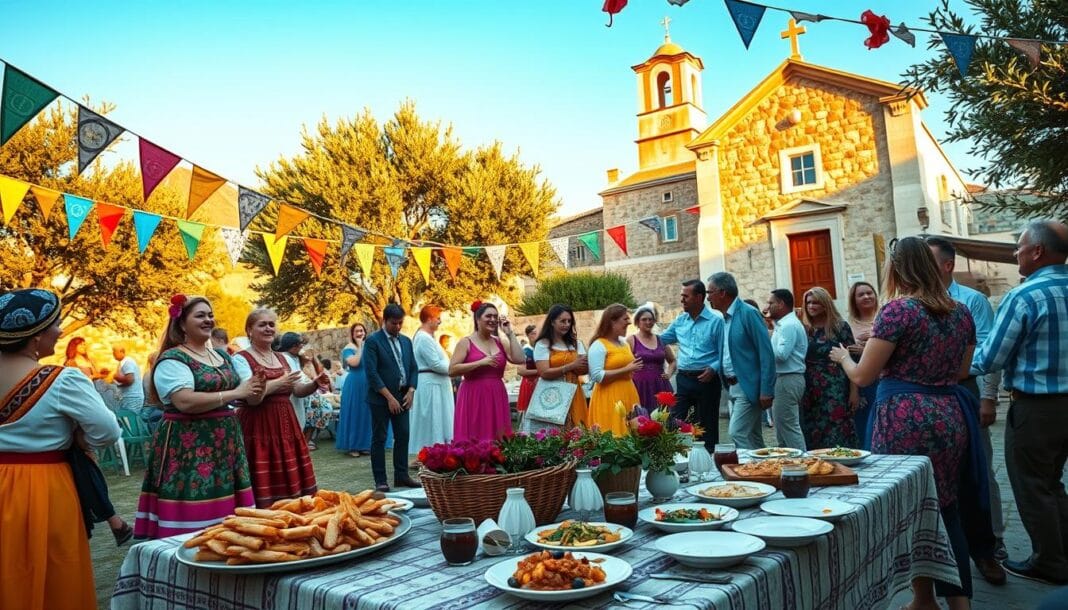Traveling through Greece, you’ll find a rich tapestry of traditions. These traditions are a big part of the country’s culture. They make your holiday truly special.
By joining in these customs, you’ll dive deep into Greek culture. It’s a way to make your trip unforgettable. Did you know the 12 days after Christmas are very special in Greece? They mix joyous celebrations with ancient rituals1.
During the holidays, you’ll see Christmas trees and boats with festive lights. This tradition started in 1883, when the first Christmas tree arrived in Greece1. Family gatherings on Christmas Eve and New Year’s Eve are common. They share traditional meals like pork or lamb roasts and sweet treats like Kourabiethes and Melomakarona1.
These experiences will help you understand Greek holiday traditions better. They show the love and hospitality, or philoxenia, that Greece is known for.
The Significance of Traditions in Greek Culture
Greek traditions show the vibrant culture of Greece. They bring people together through community and family events. Over 50 national dishes in Greek cuisine mix Middle Eastern and Mediterranean flavors, showing the culinary richness that unites people2.
Religion is key in daily life, with 98% of Greeks being Greek Orthodox. This influences many customs and traditions. Holidays are especially important, showing deep respect for cultural heritage. Greeks often name their children after their grandparents, keeping cultural roots alive3.
Greek hospitality, or philoxenia, welcomes guests with open arms. It makes visitors feel valued and cherished, strengthening social bonds. Enjoying coffee with loved ones is a common ritual, showing the ease of social interaction in everyday life4. These practices weave together to show the importance of Greek traditions, enriching both locals and visitors.
Celebrating Epiphany: A Symbolic Day of Refreshing Joy
In Greece, Epiphany is a lively celebration on January 6. It’s a key event in the Christian calendar. The day is filled with traditions that bring people together and spread joy.
The Greek Epiphany is known for its rituals, especially the Cross Diving Ceremony. This ceremony shows the mix of faith and celebration.
Understanding the Rituals of Epiphany
Epiphany in Greece is a colorful mix of faith and community. Families meet by the water as a priest blesses it. This act symbolizes Jesus Christ’s baptism.
The Cross Diving Ceremony is the day’s highlight. A blessed cross is thrown into the water. Young swimmers then compete to find it.
The Significance of the Cross Diving Ceremony
The Cross Diving Ceremony is more than a race. It’s a symbol of hope and new beginnings. The winner is thought to receive blessings and luck for the year.
This moment shows the unity and joy of Epiphany. It’s a key part of the Greek Epiphany celebrations.
Experiencing Apokries: The Lively Greek Carnival
As you explore Greece, the Apokries Greek Carnival greets you with colors, music, and joy. This event lasts three weeks before Lent, each week with its own traditions. You’ll see that the Greek Carnival is more than fun; it’s a celebration with deep cultural roots.
Traditions of the Three Weeks Leading Up to Lent
The first week starts with church celebrations, kicking off the carnival. The second week, “Kreatini,” is all about meat feasts, with delicious Greek dishes. The third week, “Cheese Week,” focuses on dairy, marking the end of indulgence before Lent.
On Skopelos Island, the music is lively, with Apokries songs in 2/4 time. Traditional instruments like bouzouki and guitar fill the streets5.
The Historical Roots of Apokries in Greek Culture
The Apokries carnival has roots in ancient customs for Dionysus, the god of wine. The carnival’s joy comes from honoring this god, evolving into today’s celebration. Skopelos Carnival songs, full of improvisation, show the power of community5.
The parades and performances bring history to life, showcasing Greece’s cultural heritage.
Unique Greek Traditions You’ll Experience During Your Holiday
Exploring Greece’s customs opens a window into its spirit. Kathara Deftera, or Clean Monday, is a day of rituals and nature. It’s a special time to connect with the country’s traditions.
Kathara Deftera: Clean Monday Rituals and Celebrations
Kathara Deftera starts Lent, a time for reflection and renewal. It’s celebrated with a feast of seafood and *lagana* flatbread. This day promotes simplicity and community.
Connect with Nature through Kite Flying
Kite flying is a beloved part of Clean Monday in Greece. Families meet in parks to fly colorful kites. It’s a symbol of the soul’s journey towards purity. The day is filled with picnics, laughter, and nature’s beauty, creating unforgettable memories6.
Endearing Customs: Name Days and Their Importance
In the vibrant tapestry of Greek culture, Greek Name Days are very special. They are often celebrated more than birthdays. Each name is linked to a saint’s feast day, making Name Days a time for those named after saints to show their hospitality.
They open their homes for gatherings with family and friends. This tradition highlights the deep importance of Name Days in Greek society. It provides a chance for community ties to grow stronger.
Celebrating Name Days is a mix of Greek culture and Orthodox Christianity. It’s a day filled with joy, where people share food and drinks. This shows the Greek value of philoxenia, or hospitality.
This custom reflects a community spirit. It celebrates the connections between people and honors the saints who inspire these names. As you join in these festivities, you’ll see a blend of tradition, joy, and love that shows the heart of Greek culture.
“Name days are more than dates; they are cherished moments of connection, reflection, and joy.”
Name Days are more than just celebrations. They are times for friends and family to come together. In Greece, these gatherings show how important relationships are.
They actively help build the connections that make life in this stunning Mediterranean nation special. Your trip to Greece wouldn’t be complete without experiencing the joy of Greek Name Days. It captures the essence of this beautiful tradition7.
Artful Expressions: The Cultural Significance of Plate Smashing
The plate smashing tradition is a lively part of Greek culture. It celebrates life’s moments with joy. Even though it was banned in 1969 for safety reasons, many still link it to personal celebrations.
Today, the tradition has evolved. Instead of breaking plates, people now throw flowers at performers. This change shows how gratitude and appreciation add color to celebrations.
For many, plate smashing is more than just breaking plates. It’s about feeling joy and being part of a community. Though some see it as old-fashioned, its spirit remains through other lively customs in Greece. It’s amazing how this tradition adapts yet stays meaningful for all to enjoy8910.
Conclusion
Exploring Greek traditions on your travels offers a deep dive into Greek culture. You’ll see lively festivals like Epiphany and Apokries. You’ll also learn about quiet customs like name days.
These traditions let you connect with local communities in meaningful ways. By diving into these customs, you join the vibrant spirit of Greece. You become part of the country’s rich story.
Your travels might include long Sunday lunches at places like Vouliagmeni or Varkiza. You’ll enjoy Greek coffee, a big part of social life. You’ll also fly kites on Clean Monday and dance with the locals, making unforgettable memories111213.
By embracing these experiences, you gain a deeper understanding of Greece. Your travels become more than just sightseeing. They become a journey of cultural discovery and connection.
FAQ
What are some unique Greek traditions you should experience during your trip?
How do Greek traditions reflect the country’s culture?
What is the significance of Name Days in Greece?
Can you explain the importance of the Cross Diving Ceremony during Epiphany?
What is Apokries and how is it celebrated?
What does Kathara Deftera represent in Greek traditions?
How is plate smashing viewed in modern Greek culture?
Source Links
- Christmas & New Years’ Traditions In Greece!
- Traditions in Greece: The Ultimate Guide — Traverse Journeys – Travel That Transforms
- Simply Greek – Cultures and Traditions of Civilization’s Birthplace
- Your Greek Odyssey Begins: Live Like a Local Guide
- Revelry and Rhymes: The Songs of Apokries in Skopelos
- Greek traditions: 7 cultural activities you simply can’t miss – Experiences in Athens, Greece
- Express Your Love in Greek: Flirting, Romance, and More
- Understanding Traditional Greek Cuisine
- Experience Modern Greek Culture in Athens | Athens by Locals
- Savings and Serenity: Exploring Athens in the Off-Season – The Boutique Vibe
- 10 Must Have Greek Experiences | Athens Insider
- Experience a Memorable Vacation in Greece
- Easter in Greece: Traditions and Best Destinations
















